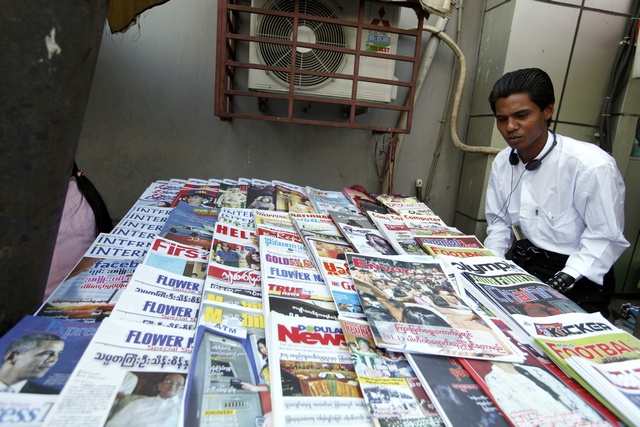Burma’s lower house of parliament on Monday passed a new media bill, drafted by the Interim Press Council, though with some amendments.
Ye Htun, a lower house bill committee member, told DVB that a clause was excluded from the bill because it appeared to give special privileges to media employees that were “unequal with other citizens”.
The media bill, which is considered a blueprint for the rights and obligations of the country’s media and the running of such enterprises, has now been passed by both Burma’s lower and upper houses of parliament, and will now go before the bicameral assembly in Naypyidaw.
Khaing Maung Ye, MP for Ahlon constituency in Rangoon, was quoted by state-run newspaper The New Light of Myanmar on Tuesday as saying: “There is a need for professional accountability in the online media and I hope that it will run in future in accordance with these rules and regulations. We discussed ‘accountability and responsibility’ many times at the lower house today.”
[related]
The Interim Press Council had previously offered Thingangyun township MP Thein Nyunt the opportunity to raise issues over the media bill on Monday; however Thein Nyunt told DVB he was denied the floor as the matter was taken directly to a vote.
“There might be another reason for it, however today the lower house decided to vote on the bill amendments,” he said. “I had prepared to speak and provide a detailed explanation on several issues, such as: what status does the Press Council have and what criteria did it pursue when drafting the Media Bill?”
He said he still hopes to discuss the bill in the union parliament [bicameral assembly]. Even if it is approved, the media bill must finally be presented before President Thein Sein who may suggest changes before signing it into law.
The Burmese government initiated a programme of press reform in June 2011, and some 18 months later lifted censorship on domestic publications, an issue that was symbolic of the country’s draconian media culture under military rule. Following the dissolution of the censorship board, Burma announced in December 2012 that private daily newspapers could be published for the first time since the 1960s. Thirty-one private dailies have since been granted publishing permits.
In a 2013 index of media freedom around the world, Reporters Without Borders rated Burma as 151st out of 179 nations, sandwiched between Iraq and Gambia. However the authors provided grounds for optimism, stating that Burma had previously “been in the bottom 15 every year since 2002; but now, thanks to the Burmese spring’s unprecedented reforms, it has reached its best-ever position.”
For more background:
http://www.dvb.no/news/press-
http://www.dvb.no/news/media-



